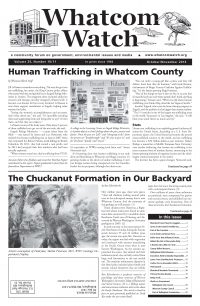by Rheanna Johnston
In the last year, Washington tate has been the center of many environmental efforts — from the governor’s Clean Power Plan to our county fighting to ban fossil fuel exports. Among these many battles against climate change has been a grassroots campaign to pass Initiative 732, the nation’s first carbon tax, on the ballot this November.
I-732 is a revenue-neutral approach that would levy a tax on the primary producers of carbon pollution — the oil, coal and natural gas industries. But any cost passed down to consumers is offset through a 1 percent reduction in the sales tax, the near elimination of a business tax on manufacturers and by funding a tax rebate for low-income families through the Working Family Tax Rebate. Washington’s tax code disproportionately hurts lower income-families and is ranked as the most regressive tax code in the country. A statement from the Sightline Institute, a Seattle sustainability think tank, claims: “I-732 would be the biggest improvement in the progressivity of Washington’s state tax system in 40 years.”
In essence, I-732 would make climate change drivers like fossil fuels more expensive, while cutting costs on everything else. We’ll pay a couple of hundred more per year for energy, but a couple hundred less each year on everything else. It’s a straightforward and extremely effective way to cut emissions and incentivize clean energy, without adding an extra tax burden on citizens.
I-732 is based on a similar and successful revenue neutral carbon tax in British Columbia. It has achieved bipartisan support and endorsement by economists, business leaders and political leaders across the political spectrum, from former state Republican Senate Majority Leader Bill Finkbeiner to climate change scientist James Hansen. The initiative is also endorsed by Audubon Washington, the Citizens Climate Lobby and Cascadia Climate Action.
But most importantly, a dedicated grassroots network of volunteers throughout the state has worked hard to spread the word about I-732. In 2015, we gathered more than 363,000 signatures, far exceeding the required 245,000 signatures to put I-732 on the ballot this year, and places it among Washington’s top 10 initiatives for signatures gathered.
To date,[[[ we have raised just over $1 million from well over a thousand small and medium-sized donors. We have about 20 active chapters across the state whose volunteers knock on doors, call registered voters and engage in other grassroots efforts, all with the goal of reaching 1 million voters by Election Day.
Whatcom County is one such seat of vital volunteer power. We were crucial players in the signature-gathering effort and continue to be an important pillar of support for the initiative. Over the past few months, a passionate crew of people — young and old — have been knocking on doors in Bellingham’s neighborhoods, handing out fliers at farmer’s markets and other events and hosting phone banking parties.
When the Whatcom part of the campaign first got up and running in June, we were a very small team. Most often it was just two or three of us knocking on doors or phone banking together in my living room over a bottle of wine. Over the last few months, not only has our dedicated Whatcom campaign staff grown exponentially, but so have our volunteer numbers. Now, armed with clipboards, green fliers, an upbeat attitude and the drive to get climate policy passed and improve our tax code, Whatcom County’s team of interns and volunteers have been working hard to engage and inform the community about the upcoming election and the importance of their vote to fight climate change.
Our community recognition has also been growing. Last summer, we were endorsed by the- Whatcom Democrats and the Community Food Co-Op, and the 42nd Legislative District Democrats and the Whatcom Green Party recently voted to endorse I-732 as well. The return of Western Washington University students this month has also marked an upswing in our volunteer numbers, and we are working hard to make the most of the final month before the election.
Whatcom County’s volunteers exemplify the aspect of this campaign that is most often underestimated by supporters and opposition alike, and yet is probably its greatest strength: the passion and dedication of the grassroots volunteers working to pass I-732. We want big action on climate change, and we’re tired of waiting around for it to happen someday.
This is our chance, as individuals, as a community concerned about climate change, and as a state ready to become a leader in climate policy, to pass a measure that has been proven to reduce emissions and will fight climate change. We don’t want to wait for politicians to finish deciding climate change is a problem — there isn’t time for it. So we’re taking the fight into our own hands and giving it everything we’ve got.
If you would like to make a donation or get involved with the Yes on 732 team and help us get real climate change policy passed, check out our website at http://www.yeson732.org to learn more or come meet the team and learn how you can help at our upcoming. We can always use more help — every vote counts.
We owe it to future generations to stop waiting and act now on climate change. Vote yes on I-732 this November!
______________________________
Rheanna Johnston is the Northwest Washington Campaign Coordinator for the Yes on I-732 campaign. She is a recent graduate of Western Washington University with a degree in environmental policy and international studies. She started volunteering for I-732 in the summer of 2015 and has been working on the campaign for a little over a year now. You can reach her at rheanna@carbonwa.org with questions or to get involved.




























